Only articles in with the "germany" tag are displayed
To display all articles click
here.
 |
4. May 2012 – 10:58 by John Heaven (TuTech Innovation GmbH)
|
Hamburg will become the latest German city to publish government datasets online, with plans to launch an open data portal by the end of this year. Exactly which data will be released, and when, is still unclear.
Hamburg already publishes some data online and is planning to release more, according to the Senate’s (Hamburg’s Cabinet’s) answer to an enquiry from Hansjörg Schmidt, the SPD parliamentary group’s representative on media and online policy.
Schools performance data, information on cancer patients, air quality and water quality are all available online and in many cases downloadable in Excel format. I had a quick look through these websites and it does appear that information in Excel format is relatively easy to get at, although it is questionable whether this is really raw data since it is presented in a non-standard format and appears in some cases (for example the schools data) to have been pre-crunched. In the case of water data, making this data open is a technical challenge — at the moment, only a description of the data is available due to its size.
The city will also release geographic data at some point, including the location of play areas and police stations. There appears to be no promise that this will coincide with the launch of the portal and no cast-iron guarantees about exactly what data will be made available.
The Senate’s response does not make a clear commitment to launch a portal, but NDR reports that the City has officially announced its intention to do so by the end of the year.
Alongside talk of an open data portal, the campaign for a Transparency Law is making much greater demands. The backers of the law want to go much further and are pushing for a law that will oblige the local government to open all of its data unless there is a compelling reason not to do so. A comment on Hansjörg Schmidt’s blog suggest that some backers of the Transparency Law may see this as an attempt to diffuse their campaign by opening some data. I am sure this will be a hot topic at the next Open Government Stammtisch on 9th May and the PEP-NET Summit on 14th May.
Posted in open data | No Comments »
 |
21. March 2012 – 12:46 by cynthiawagner
|
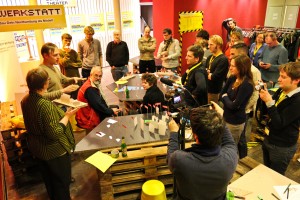 The growth of movements like the Right to the City Movement and protests like Stuttgart21, Gängeviertel, or NO BNQ show the continuously increasing demand for more public participation in urban development. The pilot project Nexthamburg experiments with new ways of public participation in the urban development of Hamburg. The concept of the open and independent crowd-sourcing project will be presented at the PEP-NET Summit on 14th May.
The growth of movements like the Right to the City Movement and protests like Stuttgart21, Gängeviertel, or NO BNQ show the continuously increasing demand for more public participation in urban development. The pilot project Nexthamburg experiments with new ways of public participation in the urban development of Hamburg. The concept of the open and independent crowd-sourcing project will be presented at the PEP-NET Summit on 14th May.
Nexthamburg gathers solutions and challenges for the city of Hamburg in crowd-
sourcing processes. Citizens can post their own solutions for the big challenges on the webpage or other Nexthamburg social media channels, discuss, comment or follow others, create their own vision for Hamburg. They can also participate in one of the Nexthamburg events, for example Nexthamburg Sessions, Salon, Zukunftscafés, or the Zukunftscamp.
The long-term goal of the project is to organize a crowd-funding channel for promising ideas for Hamburg’s urban development to finance feasibility studies and realization efforts.
Nexthamburg is active since April 2009 and has been promoted as a pilot project of national politics of urban development by the federal ministry for traffic, building, and urban development until 2011. It is supposed to become a non-profit association in 2012.
Nexthamburg on nexthamburg.de, facebook, twitter, google, flickr, youtube, issuu
Posted in Events, News, Projects, Visions | No Comments »
 |
2. December 2011 – 15:02 by John Heaven (TuTech Innovation GmbH)
|

Protecting citizens' data (photo by jaime.silva, Flickr)
The Region of Hanover (yes, that’s the correct English spelling) has dropped its Facebook page due to data protection concerns. Kommune21, an E-Government magazine, reports that recent statements from some of Germany’s regional Data Protection Commissioners (the best known example coming from Schleswig-Holstein) led the region to take drastic steps, despite the advantages of the Facebook page in reaching younger users.
As Berlin celebrates its millionth Facebook fan, this will continue to keep concerns about data protection protection high on the agenda. The Schleswig-Holstein Data Protection Commissioner’s controversial findings earlier this year ordered all organisations in his state to drop their Facebook pages and cease to use the Facebook ‘like’ button on their websites. This is because data about users is sent to servers in the US and, according to the Commissioner, not enough is done to inform users about what data are collected and what happens to them.
The Commissioner also raised concerns about the use of the Facebook “Like” plugin, which allows users to recommend a page to their Facebook friends by clicking on a button on the website concerned instead of pasting a link onto Facebook. It would appear that information about users, even those who do not have Facebook accounts, are sent to Facebook and logged-in users of the social networking site can be tracked across websites.
At the start of September, Heise, a German publisher, got itself into trouble with Facebook for developing a ‘Like’ plugin that first has to be activated by the user, in order to avoid sending any data to Facebook without the user’s consent. The dispute appears to have been resolved since Heise developed an alternative logo and only shows the Facebook logo once the user has clicked on it to activate the sharing function. You can see it in action on heise.de (the ‘Empfehlen’ button at the end of each article).
Posted in News, Trends | No Comments »
 |
5. July 2011 – 11:48 by John Heaven (TuTech Innovation GmbH)
|
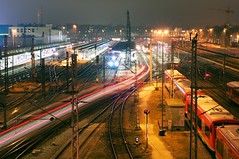
Photo by xaibex on Flickr
Starting today (5th July 2011), citizens in the German city of Ulm are invited to take part in a discussion on the redevelopment of the central station. The online discussion platform, developed by DEMOS Gesellschaft für E-Partizipation mbH, will be online until 29th July.
The first building block of the Citybahnhof concept will be the development of a new concept for the central station itself, which will involve the participants in discussing which aspects they feel are important in terms of design and transport connections to the city centre. As well as the more detailed subject matter, there are more wide-ranging issues which citizens can discuss and make suggestions about; for example the organisation of the new central station, the public transport hub at the station, getting to and from the station as well as spatial planning aspects.
The basis of the disussion will be nine draft designs. The redevelopment of the central station is possible in the medium term and the rest of the area will follow in subsequent years and will be the subject of further consultation exercises.
How’s your German? You can take a look at the site at: www.ulm-citybahnhof.de
Posted in Events, members, News, Projects | No Comments »
 |
7. June 2011 – 11:44 by John Heaven (TuTech Innovation GmbH)
|

Photo by Wrote on Flickr
Like their counterparts worldwide, local authorities in Germany are working out how to surf the web in something that is more like a huge ship than a surfboard, and how to provide something that surfers want instead of intruding on what they are doing and making them flee for the safety of the beach. As one PEP-NET Member, the City of Hamburg, publishes its social media guidelines, I review social media in German public administration.
The current issue of Kommune 21, a German E-Government magazine, gives a good overview of the social media landscape in Germany. There is a piece on Stuttgart’s comprehensive strategy for integrating several social media tools to ensure that their message gets to its target audience whilst remaining open to feedback; the City of Moers is also trying out several social media tools and has developed social media guidelines; and the City of Braunschweig reports how it has helped create a community of equals, Facebook users who exchange insider tips on which restaurants and cafés to go to.
However, Germany is well known for its suspicion of anyone who attempts to collect their data, whether the state’s pre-emptive collection of telephone records or Google’s photographing people’s houses for Street View. (Try taking a tour of a German residential area on Google Street View and you will see that many people have had their houses blurred out.) This issue will not go away, what with the increasing importance of cloud computing and the wealth of online applications that we use day to day. So Datenschutz, or data protection, is high on the agenda and warrants a place in all social media guidelines, including Hamburg’s.
Hamburg’s recently published guidelines explain some of the most common tools, describing social media use by German local authorities and providing examples of scenarios in which social media could be used. The case studies come from across Germany and indeed from across the world: from San Francisco’s activities on Twitter to the Stadtwiki Karlsruhe via Maerker Brandenburg, the Fix My Street-like service that allows citizens to report problems to their local authority and view status updates online.
On top of that, the suggested scenarios illustrate what can be achieved with social media, and how to go about it. These fictional scenarios are: a directorate uses Facebook, a district office publicises times for vaccinations on Twitter, the Culture Directorate posts videos of cultural events on YouTube, the HR department uses XING to acquire new staff, a senior official blogs, and a directorate conducts a survey with SurveyMonkey.
Each of these scenarios is accompanied by a flowchart which really nails down the procedure that has to be gone through when setting up something as simple as a WordPress blog: the departments that have to be consulted, the problems that have to be anticipated, the extra work involved and issues that have to be considered. I found this part especially interesting because, although it may seem onerous to go through such a long procedure for setting up a Twitter account, I think it is right to be honest with the public and employees about the reality of social media within a large public sector organisation like Hamburg.
So there is a lot going on in Germany in the field of open government, which thanks to projects such as Apps 4 Berlin and Munich Open Government Day, which open data to the public and encourage enthusiasts to develop apps that make use of them, is not limited to social media use. Maybe more on that in a later blog post …
Posted in good practice, members, News, Projects, Trends | 1 Comment »
 |
1. December 2010 – 14:40 by John Heaven (TuTech Innovation GmbH)
|
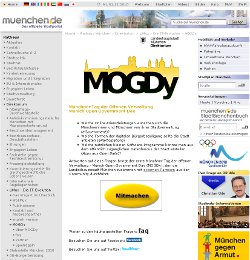
Screenshot from MOGDy website
They say a week is a long time in politics, and in eParticipation a day is just as long: Munich Open Government Day (MOGDy) is lasting, er, several months.
Starting today, the City of Munich is asking citizens to answer three questions using its dedicated online platform:
– what online services should the local government provide?
– what eParticipation initiatives should the city engage in?
– what apps could make use of the data that the city will shortly release?
Any citizen can suggest ideas and rate other people’s ideas. The five people with the top ideas will get tickets to the Oktoberfest. At the MOGDy Camp on 21st and 22nd January 2011, the city will launch its open data programme in which it will be releasing data and encouraging developers to get stuck in and create useful apps out of them. The best apps will be awarded prizes and the City will present them online.
Posted in Uncategorized | 3 Comments »
 |
17. September 2010 – 15:45 by Bengt Feil (TuTech Innovation GmbH)
|
One of the first steps in trying to open up the budgeting process is to present a communal, regional or even national budget into in way that is accessible for the average citizen. In most cases budgets are published as documents with hundreds of pages and enormous tables with number containing a bunch of zeros – which might be a hurdle for many people to join into a discussion about this important topic.
The German website OffenerHaushalt.de (in German), built by Tactical Tools (“a network of enthusiast and experts”), tries to address this problem by presenting the federal budget of Germany in an interactive and intuitive fashion. The picture below shows the front page with each ministries budget presented in a different colour.
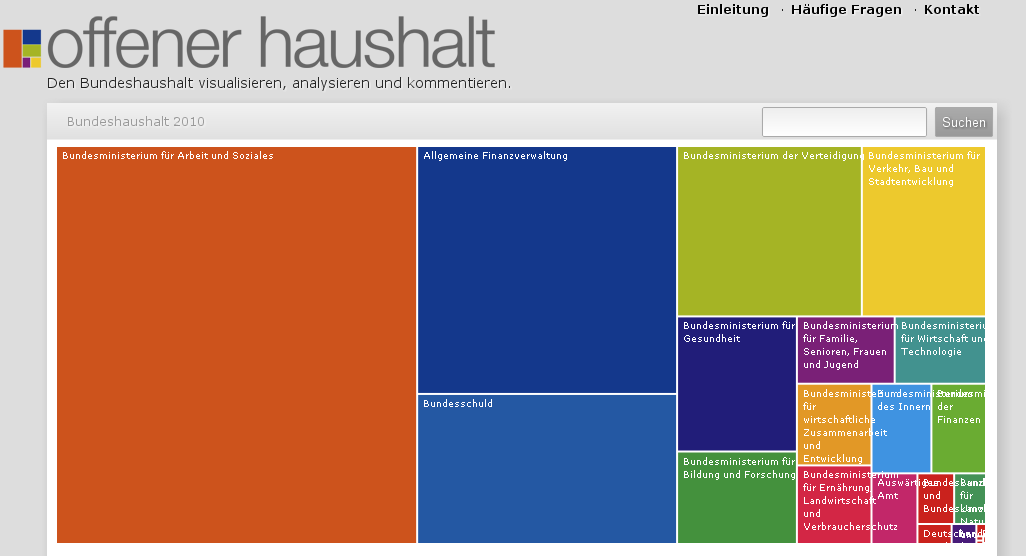
After clicking a budget (like in this case defense) the allocation of the budget to different areas and activities is shown in an easy to understand way. This way you can drill down into the budget to get a sense of its structure and how funds are used.
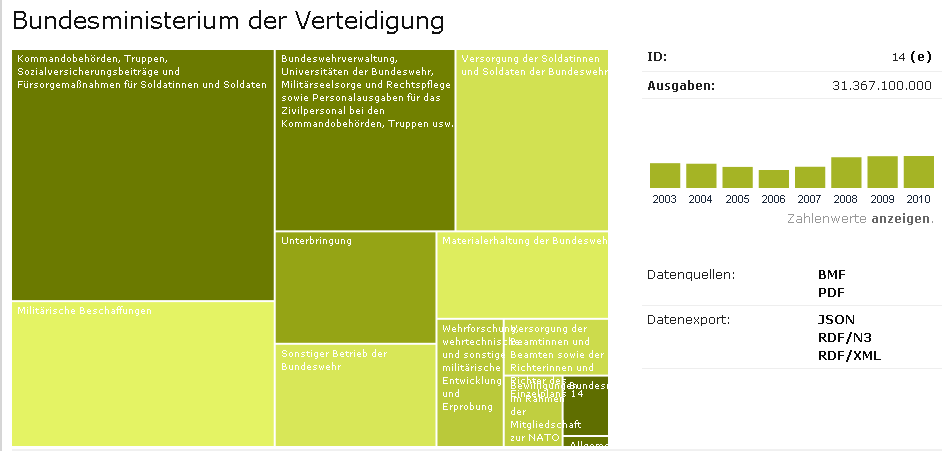
All data presented can also be exported in different standardized formats (JSON and XML among them) and all source data is also accessible. However there is also a sign for the need of more structured open data as the site is asking its visitors for hints to a machine readable version of the 2011 federal budget.
In summary this website is a great example of how to display complex numerical information in an accessible way. The ideas presented here could be integrated into eParticipatory budgeting processes to lower the barrier to entry for citizens or to help to introduce new audiences to these processes.
Posted in Tools | 1 Comment »
 |
16. June 2010 – 11:21 by John Heaven (TuTech Innovation GmbH)
|

Photo by boliston on Flickr
Whilst in hospital here in Hamburg over the weekend, I realised something that should have been obvious: Germans are masters in customer-led service design. If you had asked me last week, I probably would have said that the UK was the originator of the idea that customers and citizens can design their services to suit themselves. Now I’m not so sure… Read the rest of this entry »
Posted in Uncategorized | No Comments »
 |
1. April 2010 – 10:30 by John Heaven (TuTech Innovation GmbH)
|

By kotofoto1 on Flickr
Every morning, on my way to the underground station, I walk down a nice tree-lined lane. I think the trees feel a little taken-for-granted, though: almost all of them have some kind of banner crying out to the world how valuable they are. Slogans like “night-time owl sanctuary”, and “I filter the air!”
As a quick internet search reveals, this is all part of a protest against the local government’s plan to fell the trees. You can see a video of “Tree Night” (Nacht der Bäume), which took place on 30th September last year, on YouTube.
It seems that trees are an issue that not only Hamburgers care about: I noticed a recent article about trees that have been removed and not replaced on the Bournville Village community website. The article also contains a YouTube video, this time of a resident explaining the situation.
Both cases are examples of concerned citizens using social media, on their own initiative, to highlight local issues that are important to them and campaign for change. If you have any more such examples of “hyperlocal” media, let us have them!
***
“Nacht der Bäume” has a website all of its own (in German), as does the “Bürgerinitiative” (citizens’ action group) for Emil-Andresen-Straße. All in German, of course — that’s hyper-local for you!
For information on what “hyperlocal” means, including links to many example sites, take a look at the UK-based talk about local website.
You may also be interested in this comment piece by Jeff Jarvis in the Guardian.
Posted in Uncategorized | No Comments »
 |
15. October 2009 – 11:38 by Bengt Feil (TuTech Innovation GmbH)
|
Climate change is one of the biggest scientific, political and social problems of the 21st century. All nations of the world are challenge by the threads and to a lesser degree opportunities climate change brings with it. Consequently this topic is discussed among world leader in forums like the United Nations Climate Conference later this year. But all these efforts to mitigate the change of climate, even if there was agreement among countries on the necessity to mitigate it, will not stop the impacts of the change immediately. Therefore there is a need to look for ways to adapt to climate change and to protect humans and the environment from its negative effects.
The German ministr y for education and research has set up a series of large scale projects to research the possibilities of different urban and rural areas to adapt to climate change in the next 50-100 years. The Klimzug-Nord project will undertake this effort for the metropolitan region of Hamburg, which is influenced both by the nearby North Sea and the river Elbe. The project duration is 5 years, has an overall volume of 25 million Euro and it incorporates dozens of Universities, research centres, governmental bodies and companies. This region has 4.3 million inhabitants which will be affected by the changing climate. As the adaptation to climate change does mean major decisions in urban development and other political areas there is a need to get the cities involved in this process. This is where eParticipation meets climate adaptation.
y for education and research has set up a series of large scale projects to research the possibilities of different urban and rural areas to adapt to climate change in the next 50-100 years. The Klimzug-Nord project will undertake this effort for the metropolitan region of Hamburg, which is influenced both by the nearby North Sea and the river Elbe. The project duration is 5 years, has an overall volume of 25 million Euro and it incorporates dozens of Universities, research centres, governmental bodies and companies. This region has 4.3 million inhabitants which will be affected by the changing climate. As the adaptation to climate change does mean major decisions in urban development and other political areas there is a need to get the cities involved in this process. This is where eParticipation meets climate adaptation.
The Klimzug project does include a governance strategy which makes use of eParticipation and other participatory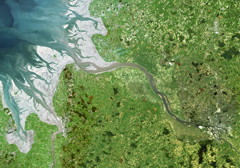 approaches. The use of eParticipation in this context has two major goals: Firstly to get citizens actively involved in the development of adaptation strategies and secondly to test how participatory tools and processes have to be designed in a context that covers a highly complex topic which stretches an extremely long time period. The DEMOS eParticipation approach developed by TuTech will be used in Klimzug-Nord to discuss possible projects, activities and policies to adapt to climate change as well as to gather the ideas and views of the people living in the region on how to best adapt and which priorities to be set. The different issues to be addressed by eParticipation in this project range from “how to organize water irrigation in agriculture” to “how to prevent major floods in the densely populated city area of Hamburg”.
approaches. The use of eParticipation in this context has two major goals: Firstly to get citizens actively involved in the development of adaptation strategies and secondly to test how participatory tools and processes have to be designed in a context that covers a highly complex topic which stretches an extremely long time period. The DEMOS eParticipation approach developed by TuTech will be used in Klimzug-Nord to discuss possible projects, activities and policies to adapt to climate change as well as to gather the ideas and views of the people living in the region on how to best adapt and which priorities to be set. The different issues to be addressed by eParticipation in this project range from “how to organize water irrigation in agriculture” to “how to prevent major floods in the densely populated city area of Hamburg”.
It will be interesting to see how eParticipation can help to open up a research project to the general public especially with such a complex topic at hand. We will report back on the problems and successes we encounter as we go along in this interesting and challenging project.
Posted in good practice | No Comments »

 The growth of movements like the Right to the City Movement and protests like Stuttgart21, Gängeviertel, or NO BNQ show the continuously increasing demand for more public participation in urban development. The pilot project
The growth of movements like the Right to the City Movement and protests like Stuttgart21, Gängeviertel, or NO BNQ show the continuously increasing demand for more public participation in urban development. The pilot project 








 approaches. The use of eParticipation in this context has two major goals: Firstly to get citizens actively involved in the development of adaptation strategies and secondly to test how participatory tools and processes have to be designed in a context that covers a highly complex topic which stretches an extremely long time period. The
approaches. The use of eParticipation in this context has two major goals: Firstly to get citizens actively involved in the development of adaptation strategies and secondly to test how participatory tools and processes have to be designed in a context that covers a highly complex topic which stretches an extremely long time period. The 





